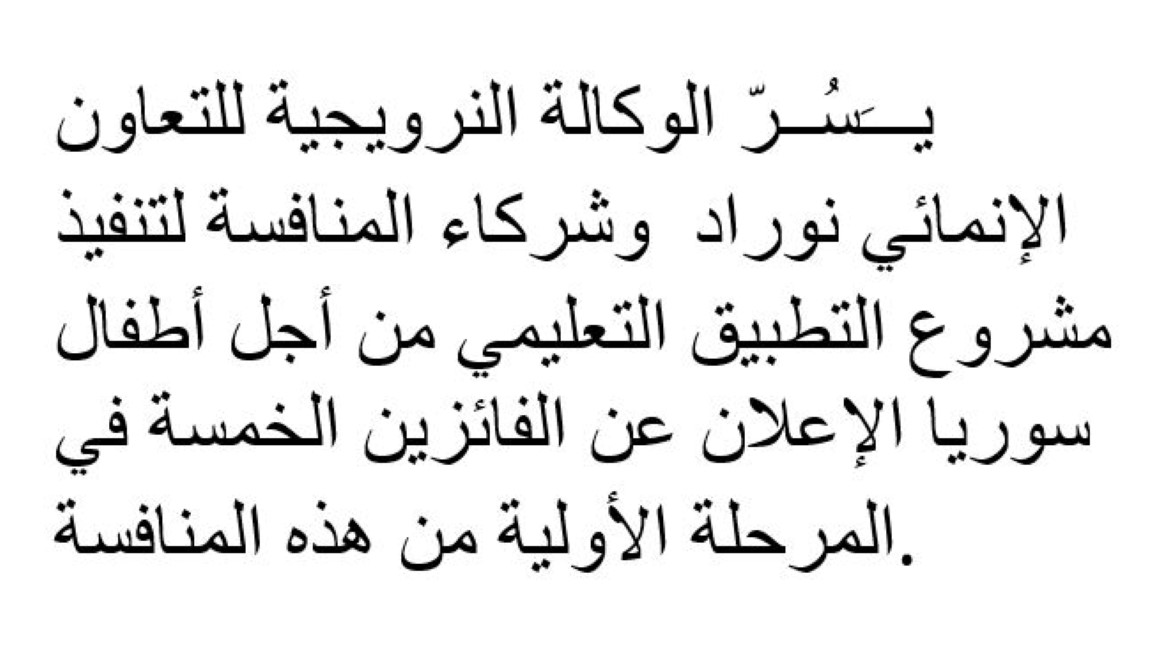Five Bidders Selected in EduApp4Syria Competition
The five selected suppliers are:
- Cologne Game Lab
- Creative Associates International
- Creuna
- Kukua
- The Center for Educational Technology
See information in Arabic below.
The winning gaming app concepts, considered to have high potential for engaging Syrian children in fun and motivating Arabic literacy learning, were selected by the competition’s international jury.
“The five selected bidders have concepts and prototypes with strong narratives and gameplay that can help keep users engaged over time. This is a crucial starting point in game-based learning,” says Dr. Alf Inge Wang, professor in game-based learning at the Norwegian University of Science and Technology (NTNU).
He has led the jury in conducting an assessment process against the criteria outlined in the competition documents. In addition to Dr. Wang, the jury included experts on the Syrian context and Arabic language, literacy, psychosocial wellbeing, and digital learning materials.
“In the next phases, the app developers need to prove that they can transform their early prototypes into learning games that Syrian children really enjoy,” Wang continued.
Next steps
Norad has entered into framework agreements with the five bidders, after receiving 78 bids from suppliers in 31 countries in an initial competition. The five bidders will over the next couple of months be provided with funding and technical expertise to further develop and improve their prototypes.
After assessment and testing, up to three suppliers will be offered contracts for phase 2, at the conclusion of which up to two winners will be announced in December this year or early 2017.
“The winners’ submissions are great concepts that we’re excited to progress through further development and testing, ” says Liv Marte Nordhaug, Norad’s Project Manager for EduApp4Syria.
“All the apps will have open source licenses to encourage maximum use and further creativity,” Nordhaug explained.
The five selected learning game concepts are:
Descriptions are based on summaries provided by the suppliers.
Antura and the Letters (Cologne Game Lab, Germany)
“Antura wa al huruf”, meaning “Antura and the Letters” in Arabic, aims to deliver a tool to teach literacy in many languages in diverse psychosocial contexts. The approach is modular and includes 25 mini games in total, plus assessments. This makes it possible to expand, reduce or change modules depending on factors such as budget, language, and context.
The didactic concept of “Antura wa al Huruf” embraces game design principles such as stealth learning, flow, and psychological player-modelling; it mixes vocabulary lessons with funny interactions with the dog Antura. Support for Arabic literacy expertise comes from - among others - an Arabic language teacher located in Syria with over 25 years of experience in teaching and curriculum design.
Katkooti (Creative Associates International, USA)
“Katkooti”, meaning “my chick” in Arabic, is an interactive pet simulation game designed to build key literacy skills through sequenced activities, as well as improve psychosocial wellbeing through caring relationships, active engagement and positive decision making.
Targeted for displaced and refugee Syrians ages 5 to 10, the smartphone app will engage them to help their Katkooti to thrive within interactive learning environments. Activities use an eight-step, phonics-based system - Integrated Quality Reading in Arabic (IQRA) - developed by Creative Associates International and proven to increase literacy.
Creative has current and recent programming in eight MENA countries, including extensive work in response to the Syrian crisis. The Katkooti core team members who themselves have Arab upbringing, will involve Syrian children and families throughout the design and development of the app.
Ressi (Creuna, Norway)
“Ressi” is a concept for a game about an adorable, vulnerable and dependent little creature. The player’s mission is to teach Ressi about the world and how to describe it: using letters, words and sentences. By taking on tasks and challenges, the player helps Ressi develop into a strong and confident character. Ressi is both a learning companion and a reflection of the player’s educational progress in Arabic literacy.
In developing this app Creuna is collaborating closely with a few key people whose first language is Arabic; have a background in children’s education; and/or have relevant work experience from refugee camps in Lebanon.
SIMA (Kukua, Italy)
Kukua is originally building a mobile game called SEMA that will allow children between the ages of 5-10 living in Sub-Saharan Africa to teach themselves how to read, write and do basic arithmetic while playing. Based on the know-how and experience gained with African users, Kukua intends to adapt and build a Syrian version of SEMA which will be renamed “SIMA”, to become a mobile literacy and psychosocial wellbeing resource for children affected by the Syrian conflict.
Kukua will continue to adopt a user-centred design approach and has built a team of arabic literacy experts to integrate a solid literacy pedagogy and curriculum as a backbone to the game; a psychologist with specific expertise on the psychosocial well-being of refugees; a Syrian storyteller to adapt the game narrative to the local culture and Syrian context; and a testing team to test the game with target users in refugee camps.
Feed the Monster (The Center for Educational Technology, Israel)
Leveraging on years of experience in developing content, methods and techniques to teach Arabic language acquisition, “Feed the Monster” is an innovative smartphone puzzle game that helps children to learn and practice the key first stages of reading in Arabic.
Kids choose their pet monster and help the monster grow by feeding it whatever letter or word it wants. The monster shows a letter or shouts it, so children can practice matching letters and words to sounds, helping them to gain knowledge and develop speed and accuracy.
The Arabic division at CET has been operating for 8 years with the purpose of promoting learning and academic success in general and Arabic literacy in particular across different age spans (from kindergarten to junior high) and integrating innovative digital media tools.

